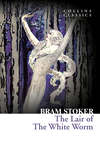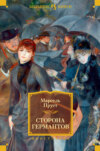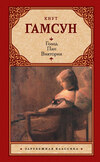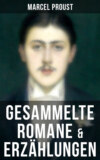Читать книгу: «In Search Of Lost Time. Volumes 1 to 7», страница 47
If Andrée had not believed me when I told her that Albertine’s relatives left me indifferent, that was because she thought that I was in love with Albertine. And probably she was none too happy in the thought.
She was generally present as a third party at my meetings with her friend. And yet there were days when I was to see Albertine by herself, days to which I looked forward with feverish impatience, which passed without bringing me any decisive result, without having, any of them, been that cardinal day whose part I immediately entrusted to the day that was to follow, which would prove no more apt to play it; thus there crumbled and collapsed, one after another, like waves of the sea, those peaks at once replaced by others.
About a month after the day on which we had played ‘ferret’ together, I learned that Albertine was going away next morning to spend a couple of days with Mme. Bontemps, and, since she would have to start early, was coming to sleep that night at the Grand Hotel, from which, by taking the omnibus, she would be able, without disturbing the friends with whom she was staying, to catch the first train in the morning. I mentioned this to Andrée. “I don’t believe a word of it,” she replied, with a look of annoyance. “Anyhow it won’t help you at all, for I’m quite sure Albertine won’t want to see you if she goes to the hotel by herself. It wouldn’t be ‘regulation,’” she added, employing an epithet which had recently come into favour with her, in the sense of ‘what is done.’ “I tell you this because I understand Albertine. What difference do you suppose it makes to me, whether you see her or not? Not the slightest, I can assure you!”
We were joined by Octave who had no hesitation in telling Andrée the number of strokes he had gone round in, the day before, at golf, then by Albertine, counting her diabolo as she walked along, like a nun telling her beads. Thanks to this pastime she could be left alone for hours on end without growing bored. As soon as she joined us I became conscious of the obstinate tip of her nose, which I had omitted from my mental pictures of her during the last few days; beneath her dark hair the vertical front of her brow controverted—and not for the first time—the indefinite image that I had preserved of her, while its whiteness made a vivid splash in my field of vision; emerging from the dust of memory, Albertine was built up afresh before my eyes. Golf gives one a taste for solitary pleasures. The pleasure to be derived from diabolo is undoubtedly one of these. And yet, after she had joined us, Albertine continued to toss up and catch her missile, just as a lady on whom friends have come to call does not on their account stop working at her crochet. “I hear that Mme. de Villeparisis,” she remarked to Octave, “has been complaining to your father.” I could hear, underlying the word, one of those notes that were peculiar to Albertine; always, just as I had made certain that I had forgotten them, I would be reminded of a glimpse caught through them before of Albertine’s determined and typically Gallic mien. I might have been blind, and yet have detected certain of her qualities, alert and slightly provincial, from those notes, just as plainly as from the tip of her nose. These were equivalent and might have been substituted for one another, and her voice was like what we are promised in the photo-telephone of the future; the visual image was clearly outlined in the sound. “She’s not written only to your father, either, she wrote to the Mayor of Balbec at the same time, to say that we must stop playing diabolo on the ‘front’ as somebody hit her in the face with one.” “Yes, I was hearing about that. It’s too silly. There’s little enough to do here as it is.” Andrée did not join in the conversation; she was not acquainted, any more than was Albertine or Octave, with Mme. de Villeparisis. She did, however, remark: “I can’t think why this lady should make such a song about it. O’d Mme. de Cambremer got hit in the face, and she never complained.” “I will explain the difference,” replied Octave gravely, striking a match as he spoke. “It’s my belief that Mme. de Cambremer is a woman of the world, and Mme. de Villeparisis is just an upstart. Are you playing golf this afternoon?” And he left us, followed by Andrée. I was alone now with Albertine. “Do you see,” she began, “I’m wearing my hair now the way you like—look at my ringlet. They all laugh at me and nobody knows who’ I’m doing it for. My aunt will laugh at me too. But I shan’t tell her why, either.” I had a sidelong view of Albertine’s cheeks, which often appeared pale, but, seen thus, were flushed with a coursing stream of blood which lighted them up, gave them that dazzling clearness which certain winter mornings have when the stones sparkling in the sun seem blocks of pink granite and radiate joy. The joy that I was drawing at this moment from the sight of Albertine’s cheeks was equally keen, but led to another desire on my part, which was not to walk with her but to take her in my arms. I asked her if the report of her plans which I had heard were correct. “Yes,” she told me, “I shall be sleeping at your hotel to-night, and in fact as I’ve got rather a chill, I shall be going to bed before dinner. You can come and sit by my bed and watch me eat, if you like, and afterwards we’ll play at anything you choose. I should have liked you to come to the station to-morrow morning, but I’m afraid it might look rather odd, I don’t say to Andrée, who is a sensible person, but to the others who will be there; if my aunt got to know, I should never hear the last of it. But we can spend the evening together, at any rate. My aunt will know nothing about that. I must go and say good-bye to Andrée. So long, then. Come early, so that we can have a nice long time together,” she added, smiling. At these words I was swept back past the days in which I loved Gilberte to those in which love seemed to me not only an external entity but one that could be realised as a whole. Whereas the Gilberte whom I used to see in the Champs-Elysées was a different Gilberte from the one whom I found waiting inside myself when I was alone again, suddenly in the real Albertine, her whom I saw every day, whom I supposed to be stuffed with middle-class prejudices and entirely open with her aunt, there was incarnate the imaginary Albertine, she whom, when I still did not know her, I had suspected of casting furtive glances at myself on the ‘front,’ she who had worn an air of being reluctant to go indoors when she saw me making off in the other direction.
I went in to dinner with my grandmother. I felt within me a secret which she could never guess. Similarly with Albertine; to-morrow her friends would be with her, not knowing what novel experience she and I had in common; and when she kissed her niece on the brow Mme. Bontemps would never imagine that I stood between them, in that arrangement of Albertine’s hair which had for its object, concealed from all the world, to give me pleasure, me who had until then so greatly envied Mme. Bontemps because, being related to the same people as her niece, she had the same occasions to don mourning, the same family visits to pay; and now I found myself meaning more to Albertine than did the aunt herself. When she was with her aunt, it was of me that she would be thinking. What was going to happen that evening, I scarcely knew. In any event, the Grand Hotel, the evening, would no longer seem empty to me; they contained my happiness. I rang for the lift-boy to take me up to the room which Albertine had engaged, a room that looked over the valley. The slightest movements, such as that of sitting down on the bench in the lift, were satisfying, because they were in direct relation to my heart; I saw in the ropes that drew the cage upwards, in the few steps that I had still to climb, only a materialisation of the machinery, the stages of my joy. I had only two or three steps to take now along the corridor before coming to that room in which was enshrined the precious substance of that rosy form—that room which, even if there were to be done in it delicious things, would keep that air of permanence, of being, to a chance visitor who knew nothing of its history, just like any other room, which makes of inanimate things the obstinately mute witnesses, the scrupulous confidants, the inviolable depositaries of our pleasure. Those few steps from the landing to Albertine’s door, those few steps which no one now could prevent my taking, I took with delight, with prudence, as though plunged into a new and strange element, as if in going forward I had been gently displacing the liquid stream of happiness, and at the same time with a strange feeling of absolute power, and of entering at length into an inheritance which had belonged to me from all time. Then suddenly I reflected that it was wrong to be in any doubt; she had told me to come when she was in bed. It was as clear as daylight; I pranced for joy, I nearly knocked over Françoise who was standing in my way, I ran, with glowing eyes, towards my friend’s room. I found Albertine in bed. Leaving her throat bare, her white nightgown altered the proportions of her face, which, flushed by being in bed or by her cold or by dinner, seemed pinker than before; I thought of the colours which I had had, a few hours earlier, displayed beside me, on the ‘front,’ the savour of which I was now at last to taste; her cheek was crossed obliquely by one of those long, dark, curling tresses, which, to please me, she had undone altogether. She looked at me and smiled. Beyond her, through the window, the valley lay bright beneath the moon. The sight of Albertine’s bare throat, of those strangely vivid cheeks, had so intoxicated me (that is to say had placed the reality of the world for me no longer in nature, but in the torrent of my sensations which it was all I could do to keep within bounds), as to have destroyed the balance between the life, immense and indestructible, which circulated in my being, and the life of the universe, so puny in comparison. The sea, which was visible through the window as well as the valley, the swelling breasts of the first of the Maineville cliffs, the sky in which the moon had not yet climbed to the zenith, all of these seemed less than a featherweight on my eyeballs, which between their lids I could feel dilated, resisting, ready to bear very different burdens, all the mountains of the world upon their fragile surface. Their orbit no longer found even the sphere of the horizon adequate to fill it. And everything that nature could have brought me of life would have seemed wretchedly meagre, the sigh of the waves far too short a sound to express the enormous aspiration that was surging in my breast. I bent over Albertine to kiss her. Death might have struck me down in that moment; it would have seemed to me a trivial, or rather an impossible thing, for life was not outside, it was in me; I should have smiled pityingly had a philosopher then expressed the idea that some day, even some distant day, I should have to die, that the external forces of nature would survive me, the forces of that nature beneath whose godlike feet I was no more than a grain of dust; that, after me, there would still remain those rounded, swelling cliffs, that sea, that moonlight and that sky! How was that possible; how could the world last longer than myself, since it was it that was enclosed in me, in me whom it went a long way short of filling, in me, where, feeling that there was room to store so many other treasures, I flung contemptuously into a corner sky, sea and cliffs. “Stop that, or I’ll ring the bell!” cried Albertine, seeing that I was flinging myself upon her to kiss her. But I reminded myself that it was not for no purpose that a girl made a young man come to her room in secret, arranging that her aunt should not know—that boldness, moreover, rewards those who know how to seize their opportunities; in the state of exaltation in which I was, the round face of Albertine, lighted by an inner flame, like the glass bowl of a lamp, started into such prominence that, copying the rotation of a burning sphere, it seemed to me to be turning, like those faces of Michelangelo which are being swept past in the arrested headlong flight of a whirlwind. I was going to learn the fragrance, the flavour which this strange pink fruit concealed. I heard a sound, precipitous, prolonged, shrill. Albertine had pulled the bell with all her might.
* * *
I had supposed that the love which I felt for Albertine was not based on the hope of carnal possession. And yet, when the lesson to be drawn from my experience that evening was, apparently, that such possession was impossible; when, after having had not the least doubt, that first day, on the beach, of Albertine’s being unchaste, and having then passed through various intermediate assumptions, I seemed to have quite definitely reached the conclusion that she was absolutely virtuous; when, on her return from her aunt’s, a week later, she greeted me coldly with: “I forgive you; in fact I’m sorry to have upset you, but you must never do it again,”—then, in contrast to what I had felt on learning from Bloch that one could always have all the women one liked, and as if, in place of a real girl, I had known a wax doll, it came to pass that gradually there detached itself from her my desire to penetrate into her life, to follow her through the places in which she had spent her childhood, to be initiated by her into the athletic life; my intellectual curiosity to know what were her thoughts on this subject or that did not survive my belief that I might take her in my arms if I chose. My dreams abandoned her, once they had ceased to be nourished by the hope of a possession of which I had supposed them to be independent. Thenceforward they found themselves once more at liberty to transmit themselves, according to the attraction that I had found in her on any particular day, above all according to the chances that I seemed to detect of my being, possibly, one day, loved by her—to one or another of Albertine’s friends, and to Andrée first of all. And yet, if Albertine had not existed, perhaps I should not have had the pleasure which I began to feel more and more strongly during the days that followed in the kindness that was shewn me by Andrée. Albertine told no one of the check which I had received at her hands. She was one of those pretty girls who, from their earliest youth, by their beauty, but especially by an attraction, a charm which remains somewhat mysterious and has its source perhaps in reserves of vitality to which others less favoured by nature come to quench their thirst, have always—in their home circle, among their friends, in society—proved more attractive than other more beautiful and richer girls; she was one of those people from whom, before the age of love and ever so much more after it is reached, one asks more than they ask in return, more even than they are able to give. From her childhood Albertine had always had round her in an adoring circle four or five little girl friends, among them Andrée who was so far her superior and knew it (and perhaps this attraction which Albertine exerted quite involuntarily had been the origin, had laid the foundations of the little band). This attraction was still potent even at a great social distance, in circles quite brilliant in comparison, where if there was a pavane to be danced, they would send for Albertine rather than have it danced by another girl of better family. The consequence was that, not having a penny to her name, living a hard enough life, moreover, on the hands of M. Bontemps, who was said to be ‘on the rocks,’ and was anyhow anxious to be rid of her, she was nevertheless invited, not only to dine but to stay, by people who, in Saint-Loup’s sight, might not have had any distinction, but to Rosemonde’s mother or Andrée’s, women who though very rich themselves did not know these other and richer people, represented something quite incalculable. Thus Albertine spent a few weeks every year with the family of one of the Governors of the Bank of France, who was also Chairman of the Board of Directors of a great Railway Company. The wife of this financier entertained people of importance, and had never mentioned her ‘day’ to Andrée’s mother, who thought her wanting in politeness, but was nevertheless prodigiously interested in everything that went on in her house. Accordingly she encouraged Andrée every year to invite Albertine down to their villa, because, as she said, it was a real charity to offer a holiday by the sea to a girl who had not herself the means to travel and whose aunt did so little for her; Andrée’s mother was probably not prompted by the thought that the banker and his wife, learning that Albertine was made much of by her and her daughter, would form a high opinion of them both; still less did she hope that Albertine, good and clever as she was, would manage to get her invited, or at least to get Andrée invited, to the financier’s garden-parties. But every evening at the dinner-table, while she assumed an air of indifference slightly tinged with contempt, she was fascinated by Albertine’s accounts of everything that had happened at the big house while she was staying there, and the names of the other guests, almost all of them people whom she knew by sight or by name. True, the thought that she knew them only in this indirect fashion, that is to say did not know them at all (she called this kind of acquaintance knowing people ‘all my life’), gave Andrée’s mother a touch of melancholy while she plied Albertine with questions about them in a lofty and distant tone, speaking with closed lips, and might have left her doubtful and uneasy as to the importance of her own social position had she not been able to reassure herself, to return safely to the ‘realities of life,’ by saying to the butler: “Please tell the chef that he has not made the peas soft enough.” She then recovered her serenity. And she was quite determined that Andrée was to marry nobody but a man—of the best family, of course—rich enough for her too to be able to keep a chef and a couple of coachmen. This was the proof positive, the practical indication of ‘position.’ But the fact that Albertine had dined at the banker’s house in the country with this or that great lady, and that the said great lady had invited the girl to stay with her next winter, did not invalidate a sort of special consideration which Albertine shewed towards Andrée’s mother, which went very well with the pity, and even repulsion, excited by the tale of her misfortunes, a repulsion increased by the fact that M. Bontemps had proved a traitor to the cause (he was even, people said, vaguely Panamist) and had rallied to the Government. Not that this deterred Andrée’s mother, in her passion for abstract truth, from withering with her scorn the people who appeared to believe that Albertine was of humble origin. “What’s that you say? Why, they’re one of the best families in the country. Simonet with a single ‘n,’ you know!” Certainly, in view of the class of society in which all this went on, in which money plays so important a part, and mere charm makes people ask you out but not marry you, a ‘comfortable’ marriage did not appear to be for Albertine a practical outcome of the so distinguished patronage which she enjoyed but which would not have been held to compensate for her poverty. But even by themselves, and with no prospect of any matrimonial consequence, Albertine’s ‘successes’ in society excited the envy of certain spiteful mothers, furious at seeing her received like one of the family by the banker’s wife, even by Andrée’s mother, neither of whom they themselves really knew. They therefore went about telling common friends of those ladies and their own that both ladies would be very angry if they knew the facts, which were that Albertine repeated to each of them everything that the intimacy to which she was rashly admitted enabled her to spy out in the household of the other, a thousand little secrets which it must be infinitely unpleasant to the interested party to have made public. These envious women said this so that it might be repeated and might get Albertine into trouble with her patrons. But, as often happens, their machinations met with no success. The spite that prompted them was too apparent, and their only result was to make the women who had planned them appear rather more contemptible than before. Andrée’s mother was too firm in her opinion of Albertine to change her mind about her now. She looked upon her as a ‘poor wretch,’ but the best-natured girl living, and one who would do anything in the world to give pleasure.
If this sort of select popularity to which Albertine had attained did not seem likely to lead to any practical result, it had stamped Andrée’s friend with the distinctive marks of people who, being always sought after, have never any need to offer themselves, marks (to be found also, and for analogous reasons, at the other end of the social scale among the leaders of fashion) which consist in their not making any display of the successes they have scored, but rather keeping them to themselves. She would never say to anyone: “So-and-so is anxious to meet me,” would speak of everyone with the greatest good nature, and as if it had been she who ran after, who sought to know other people, and not they. If you spoke of a young man who, a few minutes earlier, had been, in private conversation with her, heaping the bitterest reproaches upon her because she had refused him an assignation, so far from proclaiming this in public, or betraying any resentment she would stand up for him: “He is such a nice boy!” Indeed it quite annoyed her when she attracted people, because that compelled her to disappoint them, whereas her natural instinct was always to give pleasure. So much did she enjoy giving pleasure that she had come to employ a particular kind of falsehood, found among utilitarians and men who have ‘arrived.’ Existing besides in an embryonic state in a vast number of people, this form of insincerity consists in not being able to confine the pleasure arising out of a single act of politeness to a single person. For instance, if Albertine’s aunt wished her niece to accompany her to a party which was not very lively, Albertine might have found it sufficient to extract from the incident the moral profit of having given pleasure to her aunt. But being courteously welcomed by her host and hostess, she thought it better to say to them that she had been wanting to see them for so long that she had finally seized this opportunity and begged her aunt to take her to their party. Even this was not enough: at the same party there happened to be one of Albertine’s friends who was in great distress. “I did not like the idea of your being here by yourself. I thought it might do you good to have me with you. If you would rather come away from here, go somewhere else, I am ready to do anything you like; all I want is to see you look not so sad.”—Which, as it happened, was true also. Sometimes it happened however that the fictitious object destroyed the real. Thus, Albertine, having a favour to ask on behalf of one of her friends, went on purpose to see a certain lady who could help her. But on arriving at the house of this lady—a kind and sympathetic soul—the girl, unconsciously following the principle of utilising a single action in a number of ways, felt it to be more ingratiating to appear to have come there solely on account of the pleasure she knew she would derive from seeing the lady again. The lady was deeply touched that Albertine should have taken a long journey purely out of friendship for herself. Seeing her almost overcome by emotion, Albertine began to like the lady still better. Only, there was this awkward consequence: she now felt so keenly the pleasure of friendship which she pretended to have been her motive in coming, that she was afraid of making the lady suspect the genuineness of sentiments which were actually quite sincere if she now asked her to do the favour, whatever it may have been, for her friend. The lady would think that Albertine had come for that purpose, which was true, but would conclude also that Albertine had no disinterested pleasure in seeing her, which was not. With the result that she came away without having asked the favour, like a man sometimes who has been so good to a woman, in the hope of winning her, that he refrains from declaring his passion in order to preserve for his goodness an air of nobility. In other instances it would be wrong to say that the true object was sacrificed to the subordinate and subsequently conceived idea, but the two were so far incompatible that if the person to whom Albertine endeared herself by stating the second had known of the existence of the first, his pleasure would at once have been turned into the deepest annoyance. At a much later point in this story, we shall have occasion to see this kind of incompatibility expressed in clearer terms. Let us say for the present, borrowing an example of a completely different order, that they occur very frequently in the most divergent situations that life has to offer. A husband has established his mistress in the town where he is quartered with his regiment. His wife, left by herself in Paris, and with an inkling of the truth, grows more and more miserable, and writes her husband letters embittered by jealousy. Very well; the mistress is obliged to go up to Paris for the day. The husband cannot resist her entreaties that he will go with her, and applies for short leave, which is granted. But as he is a good-natured fellow, and hates to make his wife unhappy, he goes to her and tells her, shedding a few quite genuine tears, that, driven to desperation by her letters, he has found the means of getting away from his duties to come to her, to console her in his arms. He has thus contrived by a single journey to furnish wife and mistress alike with proofs of his affection. But if the wife were to learn the reason for which he has come to Paris, her joy would doubtless be turned into grief, unless her pleasure in seeing the faithless wretch outweighed, in spite of everything, the pain that his infidelities had caused her. Among the men who have struck me as practising with most perseverance this system of what might be called killing any number of birds with one stone, must be included M. de Norpois. He would now and then agree to act as intermediary between two of his friends who had quarrelled, which led to his being called the most obliging of men. But it was not sufficient for him to appear to be doing a service to the friend who had come to him to demand it; he would represent to the other the steps which he was taking to effect a reconciliation as undertaken not at the request of the first friend but in the interest of the second, an attitude of the sincerity of which he had never any difficulty in convincing a listener already influenced by the idea that he saw before him the ‘most serviceable of men.’ In this fashion, playing in two scenes turn about, what in stage parlance is called ‘doubling’ two parts, he never allowed his influence to be in the slightest degree imperilled, and the services which he rendered constituted not an expenditure of capital but a dividend upon some part of his credit. At the same time every service, seemingly rendered twice over, correspondingly enhanced his reputation as an obliging friend, and, better still, a friend whose interventions were efficacious, one who did not draw bows at a venture, whose efforts were always justified by success, as was shewn by the gratitude of both parties. This duplicity in rendering services was—allowing for disappointments such as are the lot of every human being—an important element of M. de Norpois’s character. And often at the Ministry he would make use of my father, who was a simple soul, while making him believe that it was he, M. de Norpois, who was being useful to my father. Attracting people more easily than she wished, and having no need to proclaim her conquests abroad, Albertine kept silence with regard to the scene with myself by her bedside, which a plain girl would have wished the whole world to know. And yet of her attitude during that scene I could not arrive at any satisfactory explanation. Taking first of all the supposition that she was absolutely chaste (a supposition with which I had originally accounted for the violence with which Albertine had refused to let herself be taken in my arms and kissed, though it was by no means essential to my conception of the goodness, the fundamentally honourable character of my friend), I could not accept it without a copious revision of its terms. It ran so entirely counter to the hypothesis which I had constructed that day when I saw Albertine for the first time. Then ever so many different acts, all acts of kindness towards myself (a kindness that was caressing, at times uneasy, alarmed, jealous of my predilection for Andrée) came up on all sides to challenge the brutal gesture with which, to escape from me, she had pulled the bell. Why then had she invited me to come and spend the evening by her bedside? Why had she spoken all the time in the language of affection? What object is there in your desire to see a friend, in your fear that he is fonder of another of your friends than of you; why seek to give him pleasure, why tell him, so romantically, that the others will never know that he has spent the evening in your room, if you refuse him so simple a pleasure and if to you it is no pleasure at all? I could not believe, all the same, that Albertine’s chastity was carried to such a pitch as that, and I had begun to ask myself whether her violence might not have been due to some reason of coquetry, a disagreeable odour, for instance, which she suspected of lingering about her person, and by which she was afraid that I might be disgusted, or else of cowardice, if for instance she imagined, in her ignorance of the facts of love, that my state of nervous exhaustion was due to something contagious, communicable to her in a kiss. She was genuinely distressed by her failure to afford me pleasure, and gave me a little gold pencil-case, with that virtuous perversity which people shew who, moved by your supplications and yet not consenting to grant you what those supplications demand, are anxious all the same to bestow on you some mark of their affection; the critic, an article from whose pen would so gratify the novelist, asks him instead to dinner; the duchess does not take the snob with her to the theatre but lends him her box on an evening when she will not be using it herself. So far are those who do least for us, and might easily do nothing, driven by conscience to do something. I told Albertine that in giving me this pencil-case she was affording me great pleasure, and yet not so great as I should have felt if, on the night she had spent at the hotel, she had permitted me to embrace her. “It would have made me so happy; what possible harm could it have done you? I was simply astounded at your refusing to let me do it.” “What astounds me,” she retorted, “is that you should have thought it astounding. Funny sort of girls you must know if my behaviour surprises you.” “I am extremely sorry if I annoyed you, but even now I cannot say that I think I was in the wrong. What I feel is that all that sort of thing is of no importance, really, and I can’t understand a girl who could so easily give pleasure not consenting to do so. Let us be quite clear about it,” I went on, throwing a sop of sorts to her moral scruples, as I recalled how she and her friends had scarified the girl who went about with the actress Léa. “I don’t mean to say for a moment that a girl can behave exactly as she likes, or that there’s no such thing as immorality. Take, let me see now, yes, what you were saying the other day about a girl who is staying at Balbec and her relations with an actress; I call that degrading, so degrading that I feel sure it must all have been made up by the girl’s enemies, and that there can’t be any truth in the story. It strikes me as improbable, impossible. But to let a friend kiss you, and go farther than that even—since you say that I am your friend …” “So you are, but I have had friends before now, I have known lots of young men who were every bit as friendly, I can assure you. There wasn’t one of them would ever have dared to do a thing like that. They knew they’d get their ears boxed if they tried it on. Besides, they never dreamed of trying, we would shake hands in an open, friendly sort of way, like good pals, but there was never a word said about kissing, and yet we weren’t any the less friends for that. Why, if it’s my friendship you are after, you’ve nothing to complain of; I must be jolly fond of you to forgive you. But I’m sure you don’t care two straws about me, really. Own up now, it’s Andrée you’re in love with. After all, you’re quite right; she is ever so much prettier than I am, and perfectly charming! Oh! You men!” Despite my recent disappointment, these words so frankly uttered, by giving me a great respect for Albertine, made a very pleasant impression on me. And perhaps this impression was to have serious and vexatious consequences for me later on, for it was round it that there began to form that feeling almost of brotherly intimacy, that moral core which was always to remain at the heart of my love for Albertine. A feeling of this sort may be the cause of the keenest pain. For in order really to suffer at the hands of a woman one must have believed in her completely. For the moment, that embryo of moral esteem, of friendship, was left embedded in me like a stepping-stone in a stream. It could have availed nothing, by itself, against my happiness if it had remained there without growing, in an inertia which it was to retain the following year, and still more during the final weeks of this first visit to Balbec. It dwelt in me like one of those foreign bodies which it would be wiser when all is said to expel, but which we leave where they are without disturbing them, so harmless for the present does their weakness, their isolation amid a strange environment render them.




















